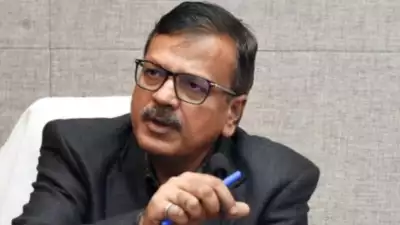LUCKNOW: Additional Chief Secretary of the Namami Gange and rural water supply department Anurag Srivastava has been selected for the Prime Minister’s Award for Excellence in Public Administration, 2023. He will be honoured by the Government of India in the Innovation State category for his pioneering use of solar power in Jal Jeevan Mission projects.
A 1992 batch IAS officer, Srivastava initiated the innovative use of solar power in Jal Jeevan Mission projects in Uttar Pradesh. The Union ministry of personnel’s secretary, V Srinivas, has communicated this recognition to Uttar Pradesh Chief Secretary Manoj Kumar Singh.
“I take utmost pride in honouring Additional chief secretary Anurag Srivastava for successful implementation of initiative ‘Solar Powered Water Schemes Under the National Jal Jeevan Mission which has been awarded the Prime Minister’s Award for Excellence in Public Administration, 2023, under the category ‘Innovation-State’, Srinivas has said in his missive addressed to Chief Secretary.
“The valuable contribution with commitment and dedicated efforts made by Srivastava towards achieving the best performance in the above category is commendable,” Srinivas said in his official communique.
The Award will be conferred on Srivastava on April 10th at a ceremony in New Delhi.
The Prime Minister’s Award for Excellence in Public Administration is conferred upon select IAS officers across the country who demonstrate exceptional work. The award aim to recognize and reward extraordinary and innovative work. The selection is made from among the Central Government’s top five priority programs.
Officer at the helm
Anurag Srivastava, a 1992 batch IAS officer, holds BTech and MTech degrees in Civil Engineering and currently serves as the Additional Chief Secretary of the Namami Gange and Rural Water Supply Department.
In his illustrious 23-year administrative career, Srivastava has held various key positions, including District Magistrate of 10 districts such as Rae Bareli, Sultanpur, Ayodhya, and Kanpur Nagar. He has also served as Commissioner of Meerut, Aligarh, and Basti. Anurag has held various key positions in both the state government and the central government. He has also served as Joint Secretary in the Ministry of Information and Broadcasting and the Ministry of AYUSH, Government of India.
Over 80% of up’s water schemes are solar powered
Notably, under Srivastava’s leadership, Uttar Pradesh has become the first state in the country to use solar power on a large scale in the Jal Jeevan Mission project. There are a total of 41,539 projects. Out of these, 33,157 projects (over 80%) are utilizing solar energy, generating 900 megawatts of electricity daily. Uttar Pradesh is the leading state in the country to achieve this feat.
Solar power cuts water extraction costs by over 50%
The use of solar power has resulted in a reduction of more than 50% in the cost of water supply in rural areas. Additionally, it eliminates the dependence on electricity for water supply. With low maintenance requirements, these solar power plants have a lifespan of 30 years. Over this period, the operation of these projects through solar energy will result in a saving of approximately Rs 1 lakh crore. Furthermore, it will lead to a reduction of around 13 lakh metric tons of carbon dioxide emissions annually.
12.50 Lakh people trained to operate solar based water projects
Under the Jal Jeevan Mission, training has been provided to 12.50 lakh people in rural areas to operate and maintain solar-based water projects. The trained locals will be responsible for the operation and security of these projects.
Selection process for the award
The selection process for this award involves multiple levels of screening. Once an application is submitted, it undergoes five stages. In the first stage, a screening committee headed by an Additional Secretary-level officer reviews applications. Members include Joint Secretary-level officers and experts from the Niti Aayog.
In the second stage, shortlisted applications receive feedback through a call centre. The screening committee analyses this feedback to further shortlist applications. In the third stage, a two-member team of central government officials, not below the rank of deputy secretary, conducts on-site evaluations of shortlisted innovative projects. Their findings are then submitted to a committee headed by the Cabinet Secretary.
In the fourth stage, the Cabinet Secretary-led committee recommends outstanding applications. This committee comprises the Prime Minister’s Principal Secretary, Niti Aayog’s CEO, and two or three non-government members. Their recommendations are then submitted to the Prime Minister for final selection. The Prime Minister grants final approval for the awards.




